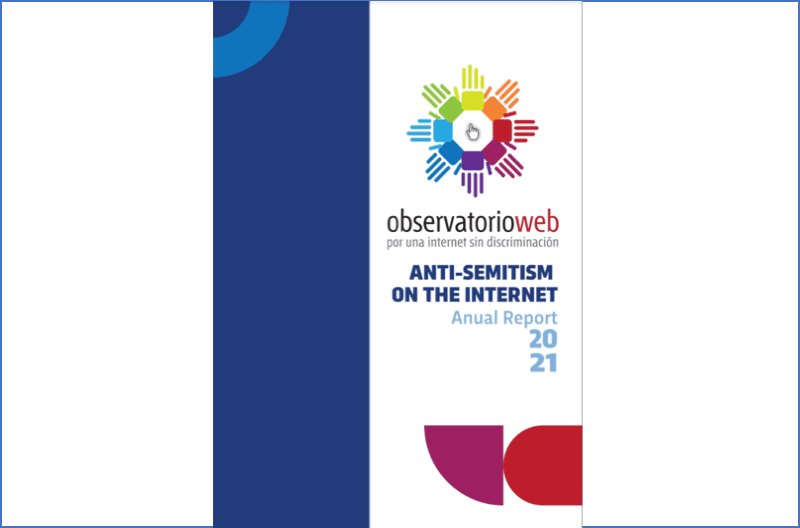The most recent edition of the “Internet Antisemitism Annual Report” reveals that the May 2021 conflict between Israel and Hamas generated an abrupt jump in the level of online antisemitism in Latin America.
The study was carried out by the Web Observatory, a joint initiative of the Latin American Jewish Congress (CJL), the Delegation of Argentine Israelite Associations (DAIA) and the Argentine Israelite Mutual Association (AMIA), which since 2010 has been working against discrimination on the Internet and for a responsible use of technologies.
The Web Observatory detected that during the fifteen days in which the escalation of violence spread, comments and publications with antisemitic content doubled on the Twitter platform, and increased by 38% on Facebook. During this brief period, half of the content surveyed in the twelve months of the year was collected. The impact of the conflict was such that 8 out of 10 antisemitic comments analyzed in 2021 made reference to Zionism or Israel.
“To address antisemitism we first need to measure it. Having clear, accurate and comparable information is the basis of any strategy,” said Claudio Epelman, executive director of the Latin American Jewish Congress (CJL) regarding the relevance of the study, which consists of a standardized measurement of antisemitism on the Internet in Latin America, and It is carried out annually based on big data and network monitoring in real time.
Except for the two weeks of the escalation of the conflict, on Twitter the level of antisemitism remained stable compared to the previous year, around 9% of the sample. In a virtual world characterized by viralization, it is important to think about the reach of the content rather than the total number of tweets. In this sense, antisemitic content had a low level of circulation, reaching barely 3% of its potential impressions.
During the days that the violence escalated, comments and publications with antisemitic content doubled on Twitter and increased by 38% on Facebook.
On Facebook, the demonization of the State of Israel was a central argument in antisemitic comments throughout the year. Likewise, conspiracy theories and denunciations of a “New World Order”, which share a base with old antisemitic arguments, were also part of the main hate speech on the platform.
In Google, although the general levels of antisemitism remain stable, there was also a noticeable growth in antisemitic content related to the term “Zionism”, and in content linked to the media. A similar trend was recorded in the case of YouTube.
The low but sustained level of year-on-year antisemitism on these two platforms can be explained, among other factors, by the regulation that is implemented. “Working with internet companies is a fundamental part of combating online hate speech. However, correct moderation also results in the migration of users to alternative platforms, without content policies or with less moderation, such as Telegram and 4chan. That is why it is essential to stay alert and up to date regarding the habits of those who spread this content”, warned Ariel Seidler, director of the Web Observatory.
Regarding the comments on the main Latin American news portals, it is also confirmed there that the antisemitic reactions are mainly linked to the State of Israel. However, there is a great disparity between the various countries analyzed: Although the average number of antisemitic comments has remained constant since 2019, Uruguay, Chile and Panama show levels well above the average. There antisemitic comments are between 15% and 19%, the annual average being 10.97%.
2021 was also characterized by the continuity of the coronavirus pandemic and, consequently, by hate speech motivated by it. While in the first stage of the pandemic there were speeches that pointed to the Jews as being responsible for the disease and non-compliance with health restrictions, with the arrival of vaccines against COVID-19, conspiracy theories are gaining strength around a plan to dominate the population through vaccination campaigns and health passes. In a clear example of distortion of the Holocaust – which also constitutes a form of antismitism – the sanitary passes came to be compared to the traditional Star of David that Jews were forced to wear during Nazism.






